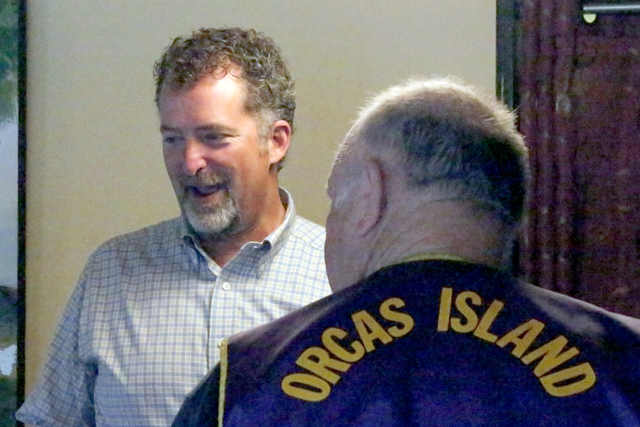Senator Kevin Ranker shared breakfast and state budget news with a cafe full of attendees on Friday, April 22.
The Lions Sunrise Volunteers meeting was held at 7 a.m. at its usual location, Island Skillet, and drew Lions Club and community members alike. Councilman Rick Hughes joined Sen. Ranker for the meeting.
“Working on the budget this year was more stressful than last year,” said Ranker, explaining that the budget is set up for two year increments, which was last done in 2015, and this year was a year of budget maintenance known as a “supplemental budget.”
Ranker said that agreeing on a budget in 2015 took longer than it ever had in previous years, and nearly caused a state government shutdown.
“It was frankly disgusting,” he said, noting the effect such a shutdown would have on Washington state’s social programs and state parks.
Ranker then dove into the finer details of the budget. He began by speaking about the increase in prescription medication costs. According to Ranker, the Senate had to allocate $400 million to prescription payments to Medicare and Medicaid because of price increases. The first idea that came to his mind was to write a bill that capped prescription prices.
“We were going to force drug companies in Washington state to be transparent with how they get the prices they are using,” said Ranker.
Speaking with various pharmaceutical companies in the state, Ranker found many blamed research and development for the increase in cost. When the Republican chair of healthcare denied creation of a panel to work with pharmaceutical companies on prescription costs, Ranker wrote a letter to the Chair of the Healthcare Authority in Washington state requesting an investigation. They agreed to do one.
“Politics has to be the art of ‘yes’ and compromise,” he said.
Ranker then brought up the “$3.5 billion problem”: the state’s requirement to fully-fund k-12 education.
“We can’t use existing funds to pay for it,” said Ranker. “There has got to be a new revenue stream.”
Because of this, Senate has yet to agree on how to handle the situation. One idea was to introduce a capital gains tax. The tax would have affected a single person making more than $250,000 a year, or a couple making more than $500,000, according to Ranker. He said the tax would have only been on the top 7500 richest people in the state, and he received a letter of encouragement signed by more than 100 of those people.
“That would have funded our k-12 problem,” said Ranker.
He projected that more than $1.66 million would have been accumulated during the first year of the tax. That bill was not approved.
A funding option suggested by the Republicans in the Senate would have been a property tax increase. San Juan County would have seen an increase of 18.9 percent, said Ranker. Eastern Washington would have had no significant increase due to the Eastern side of the state not having as high of property value as the Western side. Ranker said this second option received far fewer votes than his bill.
Since July 2015, the Senate has been required to pay a fine from the state supreme court of $10,000 a day for failing to agree on a plan for funding education. Ranker said the Senate gets around actually paying for the fine by using money already allocated to education to pay for the fees.
Ranker continued his focus on education by noting that Washington has a “massive teacher shortage.” He suggested programs to encourage teachers to move to the state by offering debt forgiveness. The plan would require a teacher to work in a district for five years to have their student loans paid off. He also hopes to extend this idea into the mental health field.
Ranker briefly touched on topics such as having epi-pens available at schools and camps and passing a bill to use road funds for marine purposes. His attention then shifted to the shared frustration of the ferry reservation system.
“I’m just as frustrated as you guys are,” said Ranker. Comments came to him from around the cafe of the necessity of Washington State Ferries having more flexibility for people with reservations.
“[WSF] just told us what they were going to do,” said San Juan County Councilman Rick Hughes, observing that WSF introduced the new 30-minute plan without any community or council input.
As the meeting wrapped up, Hughes applauded Ranker for his continued hard work.
“Kevin’s done a really great job,” said Hughes, explaining that Ranker was pivotal in keeping the Klahowya ferry afloat. WSF had planned to decommission 87-car vessel, replacing it with a smaller one. Hughes said that Ranker “found” $1 million to be able to keep the ferry servicing the islands as an inter-island vessel.
Ranker then praised Hughes for his work in the islands.
“Rick has been the most approachable [council member] and easiest to work with,” Ranker said, adding his endorsement for Hughes’ re-election to council.



